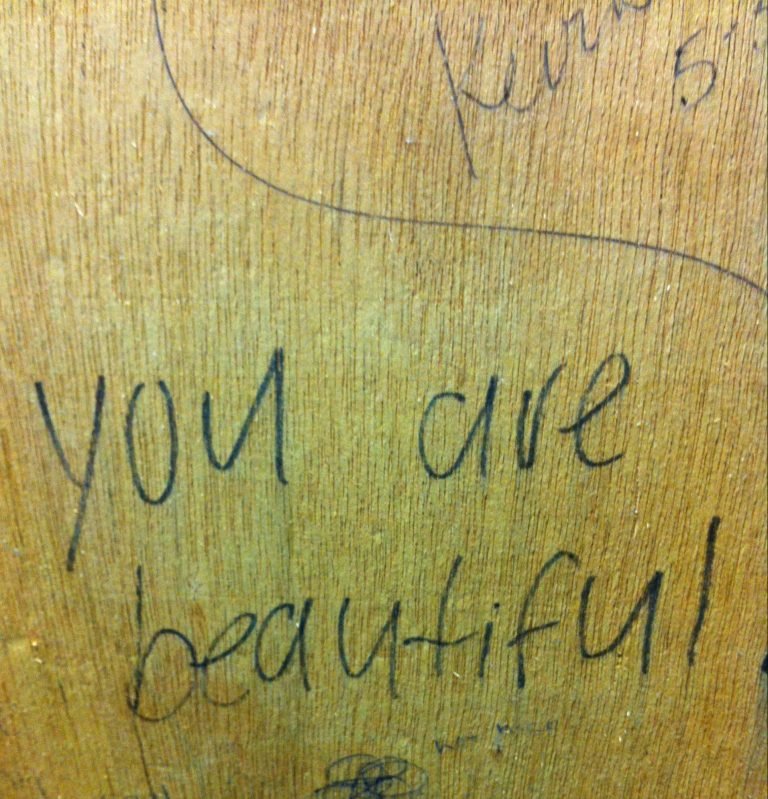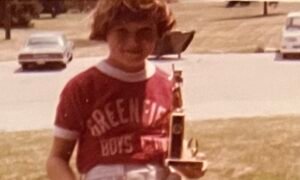It’s a fallacy, that old grade school rhyme: “Sticks and stones may break my bones, but names will never hurt me.”
I’m pretty sure nothing could be further from the truth. Those who have been called “stupid, fat, dumb, worthless, wanna-be, retard…” and much, much worse will probably agree. As a purveyor of words, I believe unconditionally in their strength to both uplift and to wound — sometimes near mortally. That’s why my kids are not allowed to say “stupid,” or “retard,” or “hate.”
I very distinctly remember my classmates who were bullied in grade school, in middle school, in high school. The ones who kept their eyes down as they walked to their classrooms. The ones who tried to blend in with their lockers, to become invisible. My own kids are not immune to that pervasive, school-aged persecution. In fact, the one who is bullied the most is the one who swallows it like a poison, letting it flow through his veins and settle into his belly, silently and painfully. He doesn’t want to talk about it, doesn’t want to cry in front of us. So he cries alone. And as parents, we hold him when he lets us, we tell him at every opportunity how much we love him, how much potential he has, that he’s a human people will flock to. That those who don’t already see this truth are the ones who are missing out.
They are held to such high and impossible standards, these kids. All of them. The pretty, smooth-skinned, model-thin girls; the athletic, muscular, winsome boys. When did these pre-defined traits become our societal models of perfection, of ultimate attainment? And when will we be able to abolish them forever? When can we all learn to say, “You are enough. You matter. You are here for a reason.”
Is speaking of unconditional love enough? Is telling our kids they’re perfect just as they are the solution? Can kindness and love negate anger and hostility and mean-spiritedness? I have to believe that it can, that it must.
Today, I watched this exquisitely heartbreaking video poem about the power of words and the agony of externally-inflicted pain. It cracked me wide open. I think it should be required viewing for everyone who shares this planet. And after each person watches it, I think he should be required to hug someone else, to offer a hand and a kind, encouraging word.
“To This Day” by Shane Koyczan
Over 4 million views. That’s no accident. This powerful statement was viewed over 4 million times by people who are hurting… and by the people who hurt them. That’s every single one of us. Every. Single. One. We are hurters. We are hurtees. We are all of that human fallibility rolled up into a package of skin and bones and tattoos and birthmarks and pimples and innies and outies.
Those lovely words and images made me think back to my early years of education and all the crazy boxes we climbed into. The jocks, the cheerleaders, the geeks, the brains, the misfits. (“Breakfast Club,” anyone?) When we are young and malleable and trying to find our way, it’s easy to claim a box in which you can feel temporarily sheltered from the cold, hard glare of the rest of the world. We put ourselves in boxes, put others in boxes, to maintain some perceived sense of safety, to help unclutter and categorize the messiness of life. We are, each and every one of us, egocentric human beings trying to preserve ourselves, sometimes — too often times — at the expense of others. Some of us navigate that tightrope of self-actualization and outward focus better than others. Most of us fall, get back up, and try again.
And again.
I didn’t necessarily persecute my peers when I was young, but I am haunted by the fear that I didn’t do enough to lift them up. Sometimes I saw bullying and stopped it. Other times, I was too busy winning an intense game of 4-square or bossing my friends around to make others’ problem my own.
Sometimes I’m still too busy.
I can do better.
We can all do better.
This is not a new conversation. These very words have been spoken for years, for decades. I’m not creating a new dialogue, but I’m contributing to one that needs to continue living and breathing. Our generation needs it. Our kids need it. Their kids will need it. We can’t stop talking until we Get It.
I still see it in human interactions everywhere — in school, in the post office, in office buildings, in political debates, on airplanes, in restaurants.
“I’m right, you’re wrong. My solution works, yours doesn’t. I have the right things, you don’t. I’m rich, you’re poor. I work hard, you’re lazy.”
And I’m no psychologist, but I believe all these comparisons emanate from our innate sense of “not enough.” If we can make others feel less than, we feel more than. But friends, it doesn’t work that way. Our own worth is an inside job. Nothing we glean from the outside — nothing we strive for or cling to or sacrifice our souls for in our external world — can fill us up as long as we continue to allow ourselves to feel empty.
Making others feel unworthy does not create our own worthiness.
I think, then, the solution is clear. Move toward love. Step by step, breath by breath, moment by moment, choose kindness. When you want to belittle someone else, stop. Think. Breathe. Redirect. Reach out. Be gentle.
Choose authenticity.
Choose vulnerability.
Choose hugging with reckless abandon.
Choose smiling at strangers.
Choose the underdog. Pick her first.
Choose to say, “I love you. You matter. You’re beautiful.”
Words can and do hurt. Some have sharp, shiny edges that cut deeply and leave lasting, visible scars. Some are soft and welcoming and safe. Choose those pillow-words. Wrap your world in kindness. Open your heart to give, and you can’t help but receive.
We can all win. We are all beautiful. We all contribute unique and lasting gifts to this little blue planet. Every single one of us. We live in a universe of abundance, not scarcity. There is enough to go around. Let go. Let someone in. Let someone love you. Love back. Nurture each other’s gifts and revel in what each has to offer. Acknowledge that despite our perceived differences, we are all human beings worthy of acceptance, and grace, and empathy.
You will bless me. I will bless you. Be open to receive it.
Be Love.





8 Responses
Wow, powerful and so important. I wonder if anyone gets out unscathed? I was called Four-eyes, Baggy Pants and the Nitwits (because I wore a pair of Lee painter pants to school one day – I promptly altered them to make the legs so narrow they were hard to pull on), Goody Two Shoes and Teacher’s Pet. I had a group of boys get off the school bus at my stop to accuse me of lying about my grade school crush kissing me – he was one of the popular boys.
But I also left the least athletic girl to the last when picking teams, allowed my friends to snub and be mean to other girls (I conveniently don’t remember if I did any snubbing) and worked hard to remain “accepted” among the group of most popular girls. The only thing that kept me there was my athletic ability and then, even that wasn’t enough – eventually I was ostracized, teased mercilessly for relating how that same boy made a pass at me to my “best” friend. I went into a deep depression…but this was before prozak and medicating children became common-place. It took 36 years for someone to tell me I was beautiful. It took another 8 years for me to believe it. Parents, please tell your kids they are beautiful, worthy and loveable. Remember beauty is subjective and we all are to someone.
And in the absence of believing we are beautiful, we accept people and behaviors in our lives that are not in our best interest and we invariably end up trying to numb all the hurt by self-medicating, whether it be with booze, drugs, food, shopping…you name it.
This was absolutely inspirational, and your completely right. Thank you so much for sharing this, very powerful piece of writing.
Thank you so much for your kind words, Sara. 🙂
aaaw, thanks no problem! 🙂
The other hard part is that teenagers are as a whole rather concrete. The world is black and white to them…. She likes me/She hates me, He is good/He is bad, Cool/Not Cool etc. There is only extremes, no grey (some adults never get past that stage either) which then lends itself to placing of people in ‘boxes’ or categories. It also leads to clique behavior because “we are alike” and others are “not like us” and it is rare to see someone move between groups because that goes against their worldview. It is our job as parents, adults, educators, mentors to get them to see the grey and embrace it.
Amen!
LOVE IT!!!